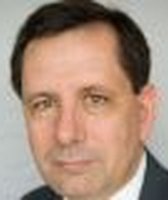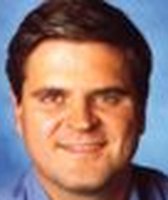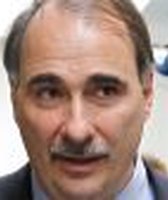Get PolitiFact in your inbox.
SUMMARY: The Rev. Jeremiah Wright's fiery sermons have caused trouble for Sen. Barack Obama, so the candidate's advocates have pointed out that Wright also has a link to former President Bill Clinton. But the connection between Wright and Clinton is being grossly overstated.
It was a sensitive moment in history. President Bill Clinton was under intense fire for his relationship with Monica Lewinsky. An independent counsel report was about to come out accusing him of perjury and obstruction of justice. Few seemed satisfied with Clinton's vague admission that he had acted inappropriately.
One of Bill Clinton's closest spiritual advisers, evangelical leader Tony Campolo, recommended Clinton come clean and publicly ask forgiveness from religious leaders — and by extension, the American people — at his annual White House prayer breakfast on Sept. 11, 1998.
More than 100 religious leaders from around the country were invited. Conservative and liberal, Jewish, Catholic, Southern Baptist, Muslim.
At one of the tables that morning was the Rev. Jeremiah Wright, pastor of Trinity United Church of Christ in Chicago. This was the same Jeremiah Wright whose longtime association with Sen. Barack Obama, coupled with his incendiary comments from the pulpit about America, have made him the most controversial figure of this presidential election season.
The intersection of the Clintons and Wright that day has become fodder for charges of hypocrisy, since Sen. Hillary Clinton has made so much of the fact that Wright is Obama's longtime pastor. She says she would not have remained a member of Wright's church, as Obama has, after Wright delivered sermons in which he said, for example, that Sept. 11 was America's "chickens coming home to roost."
In a letter endorsing Obama on April 21, 2008, Michael Moore, Academy Award-winning filmmaker of such documentaries as Fahrenheit 9/11 and Sicko, stated:
"Mrs. Clinton continues to throw the Rev. Wright up in his face as part of her mission to keep stoking the fears of White America. Every time she does this I shout at the TV, 'Say it, Obama! Say that when she and her husband were having marital difficulties regarding Monica Lewinsky, who did she and Bill bring to the White House for 'spiritual counseling?' The Reverend Jeremiah Wright!'"
Actually, Obama did speak to the matter.
In an interview with Philadelphia radio talk show host Michael Smerconish on March 24, 2008, Obama made the connection.
"But understand this, something else that I think has not gotten reported on enough, is despite these very offensive views, this guy has built one of the finest churches in Chicago. It's not some crackpot church. I mean, witness the fact that Bill Clinton invited him to the White House when he was having his personal crises."
A few days earlier, the Obama campaign released a photo of Rev. Wright shaking hands with Bill Clinton at the prayer breakfast.
They also provided a two-sentence letter Clinton wrote to Rev. Wright the following month. "Thank you so much for your kind message," Clinton's letter reads. "I am touched by your prayers and by the many expressions of encouragement and support I have received from friends across the country."
So Obama is right that Rev. Wright was invited to the White House during a Clinton crisis. And some could certainly argue that the Rev. Wright being there that day lends credence to Obama's point that Wright was not some fringe, rogue preacher as he has been portrayed.
It also is true that following the prayer breakfast that day, President Clinton did begin a long-term program of spiritual counseling with a small group of ministers. Wright was not among them.
Religious leaders close to the Clintons say that to imply the Rev. Wright was some sort of spiritual adviser to the Clintons — as Moore did — is a gross distortion.
"I think this would be a good example of the way in which facts are being twisted in this campaign," said Campolo, a professor at Eastern College in St. Davids, Pa. "President Clinton did reach out to Rev. Jeremiah Wright, as he did to about 100 other participants in that very important prayer breakfast.
"To suggest he (Clinton) had some kind of close relationship with Wright, like Barack Obama did, is going too far," he said.
The Rev. Don Argue, an Assembly of God pastor, remembers attending the prayer breakfast. He sat at a table with Vice President Al Gore.
"There was no individual counseling or conversations going on," Argue said. "There was no interaction. We had breakfast, we heard from the president, we had a time of prayer and then we all went to the exit and were gone."
"It was not a counseling thing," Argue said. "There was no spiritual counseling at all. That would be a big stretch."
Argue said in his many conversations with the Clintons over the years "Wright's name was never mentioned."
There is no mention of Wright in any of the media reports about the prayer breakfast. Nor does his name appear in Hillary Clinton's recently released White House schedules that day — or any other day. Dr. Gerald Mann, then of the Riverbend Church in Austin, Texas, gave a blessing at the prayer breakfast that morning.
Then Clinton spoke "from the rock bottom truth of where I am."
"I don't think there is a fancy way to say that I have sinned," Clinton said.
Clinton went on to ask for forgiveness from his family, his staff, his Cabinet, Monica Lewinsky and the American people. A reporter noted that "the stillness in the room was electrifying" and later, one minister called it one of the most powerful sermons he had ever heard.
Afterward, Mann said he was approached by a White House staffer and invited to accompany the Clintons in their limousine ride to and from the National Cathedral for a prayer service for embassy employees killed in East Africa.
"My point is that the president sought my counsel, and the counsel of several others," Mann said. "He could have sought the counsel of any number of people we don't know about, but he did not seek out Mr. Wright that day, to my knowledge."
During the limo ride, Mann said Bill Clinton asked him if he was familiar with a restoration procedure in which a sinner submits to a regimen of prayer, scriptural study and repentance, under the guidance of three or more ministers.
Those three ministers ended up being Campolo, the Rev. Gordon MacDonald, then senior pastor of Grace Chapel in Lexington, Mass., and the Rev. J. Philip Wogaman, pastor of Foundry United Methodist Church, which the Clintons regularly attended in Washington, D.C.
Rev. MacDonald told PolitiFact he met with President Clinton personally, often in the Oval Office, every four or five weeks, with most visits lasting more than two hours.
Campolo and Wogaman met similarly with Clinton and after each meeting, the three conferenced by phone and kept each other apprised of observations and concerns. About every six months, the three ministers met with the president as a foursome. And the meetings went on until the very last week of the Clinton presidency.
"In every way, President Clinton kept his word both to our group and to the larger public when he said he would meet with us," MacDonald said. "I think you would find that each of us found the experience satisfying and useful."
Campolo said they discussed things like "How could this have happened? What went wrong? How can we keep it from happening again?"
The Rev. Wright was never a part of that, MacDonald and Campolo said.
"I would have been quite aware if Rev. Wright had been a part of any ongoing counseling to President Clinton or his wife," MacDonald said. "Although an argument from silence is always suspect, I can only tell you that Rev. Wright's name never arose in all of our many conversations. I believe that speculation about any tie between the Clintons and Rev Wright is empty."
MacDonald spent several hours with President Clinton the night before the prayer breakfast and slept in the Lincoln bedroom at the White House (though he jokes he did not make a contribution to the Democratic Party). MacDonald said he's aware of the photo of President Clinton and the Rev. Wright conversing at the prayer breakfast, but he notes that there were over 100 religious leaders at the breakfast and, "I think you would find that there are several dozen such photos with clergy from all over America."
Our Sources
MichaelMoore.com, "My Vote's for Obama (if I could vote)..." by Michael Moore, April 21 2008
New York Times Politics Blog, "Photograph of Bill Clinton and Rev. Wright Surfaces," by Kate Phillips, March 20, 2008
New York Times, "Letter from Bill Clinton to Rev. Jeremiah Wright," Oct. 28, 1998
MSNBC First Read, "Obama: Addressing Wright on Easter," March 24, 2008
WPHT-Philadelphia, Michael Smerconish talks with Democratic Presidential candidate Senator Barack Obama, March 24, 2008
Interview with Dr. Gerald Mann, former pastor of Riverbend Church in Austin, Texas, April 23, 2008
Interview with Dr. Tony Campolo, professor at Eastern College in St. Davids, Pa., April 24, 2008
Interview with the Rev. Don Argue, an Assembly of God pastor, April 24, 2008
Interview with the Rev. Gordon MacDonald, former senior pastor of Grace Chapel in Lexington, Mass., April 24, 2008


















































